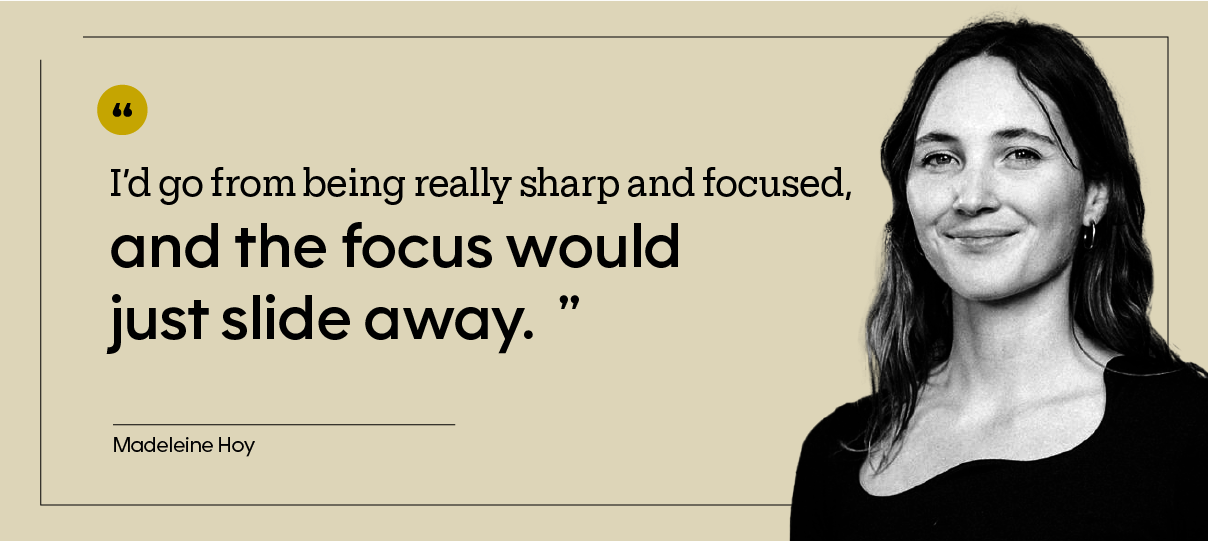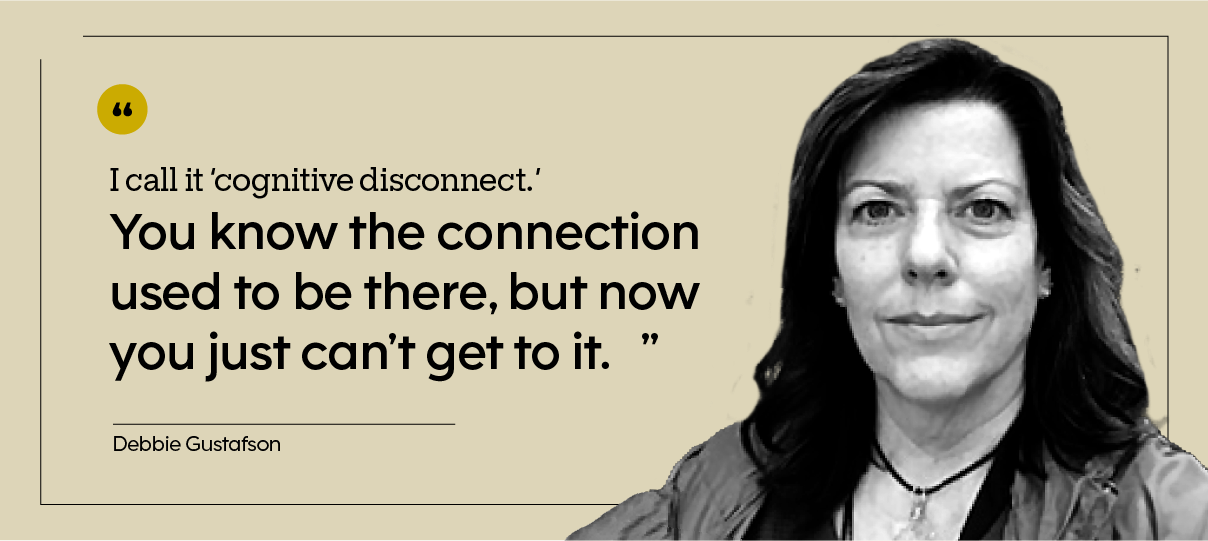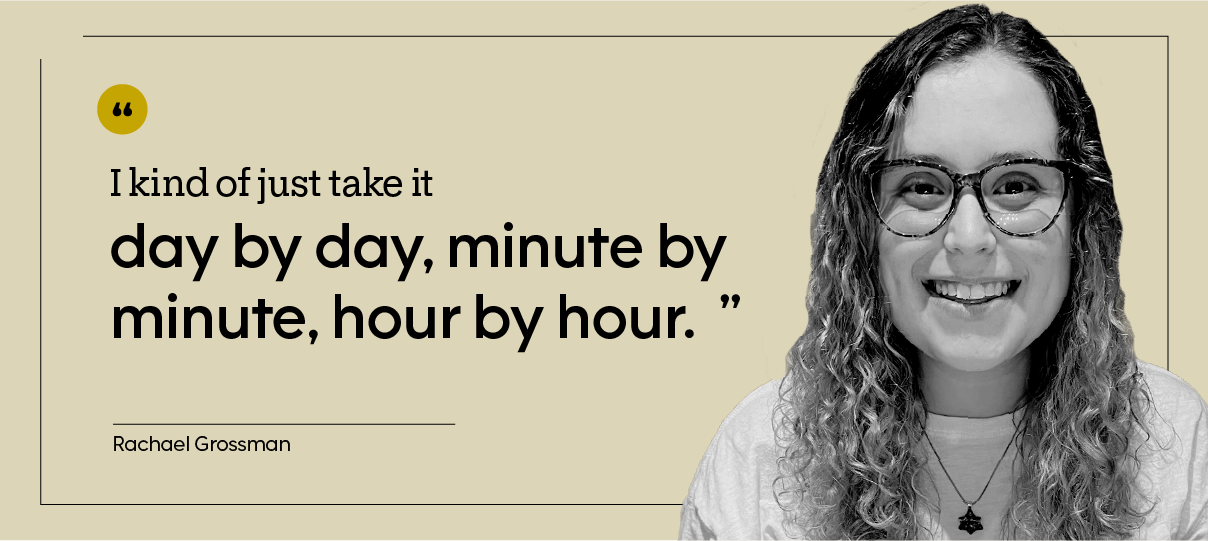Key takeaways:
Brain fog is a cognitive symptom associated with a range of illnesses.
Those who suffer from brain fog say it has affected many aspects of their lives.
It often requires persistence to get a diagnosis and care for brain fog.
Madeleine Hoy started experiencing what many people call “brain fog” about 6 years ago. At first, she figured it would pass. But it only seemed to grow worse over time.
Madeleine, a 30-year-old designer, wasn’t sure what was causing her symptoms. And doctors were not sure either. At one point, her healthcare providers suggested it had psychological roots.
Madeleine knew one thing: the brain fog was affecting almost every aspect of her life.
Search and compare options
She had to stop working full-time. She didn’t see her friends and family as often. At one point, she called her family and said, “I’m really scared about my future.”

“I’d go from being really sharp and focused, and the focus would just slide away,” she says. “Conversing with other people was difficult, because you can’t focus, you can’t understand what they’re saying.”
Brain fog is a symptom connected to an array of illnesses, including COVID-19. It can cause confusion, difficulty concentrating, memory loss, attention struggles, and fatigue.
Madeleine eventually connected her symptoms to chronic fatigue and bowel issues. Here, she and other women who have struggled with brain fog share how it feels with GoodRx.
What COVID brain fog feels like
In 2007, Debbie Gustafson traveled to Africa for a mission trip. When she returned home to Pennsylvania, she was feeling exhausted and mentally foggy.
Debbie was eventually diagnosed with Guillain-Barré syndrome, an autoimmune disorder. Eventually, her cognitive fog seemed to mostly fade. That is, until it came back with a vengeance in 2020.
Read more like this
Explore these related articles, suggested for readers like you.
That’s when Debbie returned from another international trip, this time to Ecuador, and wasn’t feeling well. But the symptoms that she thought were caused by fatigue and jet lag turned out to be COVID-19.
“The brain fog was one of the earliest things that developed,” she says. And this time it was much more pronounced. “Things that were once really simple just didn't process the same” in her mind, she says.
She couldn’t remember the five-digit code to unlock her car. Working with technology became more difficult. Her daughters got frustrated with her for forgetting conversations.
She struggled to maintain all three of her part-time jobs: handling payroll and benefits for her husband’s company, doing insurance billing for a psychology practice, and working at events.
“At some point, I had to say, ‘I can’t do this anymore,’” she says.
Debbie says the term “brain fog” falls short of describing the extent of its impact.

“I call it ‘cognitive disconnect,’” she says. “You know the connection used to be there, but now you just can’t get to it.”
Even after testing negative for COVID, Debbie had a waxing and waning array of symptoms. It felt like a game of Whac-a-Mole as doctors struggled to pin down the cause of her brain fog. The experience left her worried and, for a time, she even questioned herself.
“You wonder if you're losing your mind, because you’re being told ‘tests are OK,’ but you know you feel far from OK,” she says.
To help navigate the brain fog, she had to write down conversations, post sticky notes everywhere, and start doing tasks in shorter increments to maintain her focus.
She has been to a cardiologist, a pulmonologist, a neurologist, and a speech therapist, but she now realizes that she may not be able to get back to where she was before.
Her experience has left her with some advice for others dealing with brain fog caused by COVID. She says getting outside in the fresh air can help. And she says you have to be patient and persistent. Also, letting go of your pre-COVID baseline and acknowledging any progress post-COVID is key, she says.
“You have to advocate for yourself. And you have to keep trying to find someone who's willing to say, ‘Yes, I understand. This is real. And we have things we can try to help you,’” she says.
Noticing memory lapses and fatigue
Rachael Grossman was just 17 and looking forward to graduation from her suburban Cleveland high school when she developed whooping cough.
As time went on, she says, she “started to notice a lot of that cognitive impairment, a lot of that brain fog, a lot of the memory issues.”
At first these symptoms were “kind of mild,” she says, “just some memory lapses here or there — maybe some fatigue.”
The search for a cause began. In 2019, after being initially misdiagnosed with anxiety, she was diagnosed with postural orthostatic tachycardia syndrome, also known as POTS, a disorder of the autonomic nervous system.
She says her POTS and the associated brain fog may have been brought on by the whooping cough and by another condition she faces, Ehlers-Danlos syndrome, a connective tissue disorder.

Now, at age 22, Rachael is a college student studying neuroscience. Her cognitive fog has continued and presents significant challenges.
“I can be hearing what the professor is telling me, but I’m not really comprehending,” Rachael says. “I can have all these plans to study for all these tests, and then I’m just not retaining what I am reading. It affects my ability to have conversations with people. I could be in the middle of talking to someone, and all of a sudden I’m just like, ‘Wait, what are we even talking about?’”
She stopped driving for fear that her lack of concentration would cause an accident. She had to quit her job as a medical scribe, taking notes for emergency room physicians.
“My whole life just kind of turned upside down,” she says.
But she has worked hard to find ways to navigate the situation.
Rachael tries to notice when she’s getting “spacey.” When that happens, she’ll take a nap, go on a walk, or splash her face with cold water. Exercise and a good diet also help, she says, as does staying hydrated.
She writes everything down on her phone or calendar so she doesn’t forget. Also important, she says, is being open and upfront about what she’s experiencing.
She’ll tell people, “Hey, I might have some brain fog. Just be patient with me.”
Like Debbie, Rachael says people suffering from brain fog need to advocate for themselves.
"I was told for so long that everything was in my head, and then I started to believe that, ‘Oh my god, am I truly making these symptoms up?’” she says.
Rachael isn’t sure when her brain fog will lift.
“The hope is that we can calm down my POTS and just calm down, like, the inflammation in my body. Hopefully, the brain fog will kind of level itself out,” she says. “I don’t really know, honestly. I kind of just take it day by day, minute by minute, hour by hour. That’s just what you have to do.”
Her best advice? Don’t give up.
“Don’t take one answer and go with it,” she says. “If you need to get a second, third, or fourth opinion, just keep going until you basically figure out what’s going on.”
Finding the silver linings
It was COVID-19 that led to Gianna Biscontini’s brain fog. When she first came down with COVID, she expected that she’d feel mentally fuzzy and have flu-like symptoms.
But even after her COVID abated, the 40-year-old Los Angeles behavior analyst and author found that she was much more scattered and forgetful than she’d been before. She was leaving her sprinkler on for 6 hours, forgetting to turn off her stove, and losing track of important events.

“I was missing meetings, I was missing deadlines,” she says — things that had never been an issue before.
She works around the brain fog by putting sticky notes around the house and writing more things down. She says that an anti-inflammatory diet and other such overall health measures help as well.
But she’s also noticed a silver lining. Along with the brain fog, she also experiences less internal self-judgment, which has allowed her to pursue creative projects that she might otherwise have talked herself out of doing.
Her advice? “If it’s happening to you and you can’t do anything about it, use it as an opportunity to become healthier, to take better care of your body.
What does the doctor say?

Patricia Pinto-Garcia, MD, MPH
Medical Editor
There are lots of medical terms that describe changes in a person’s ability to think, concentrate and respond to input from the world around them. “Brain fog” isn’t a medical term, however, and it isn’t always the right term to describe what people experience. People with brain fog can have many cognitive symptoms — from difficulty with concentration and short-term memory to struggles with feeling tired and mentally drained after simple tasks.
The term caught on during the COVID pandemic. It is often used to describe symptoms people have experienced during and after COVID. But the term is now spilling over to other conditions, too. Symptoms brought on by other illnesses or conditions that may have been ignored in the past are now being recognized as “brain fog.”
Though the COVID pandemic shined a light on neglected cognitive symptoms, scientists still don’t know what causes “brain fog.” Until there’s more information, it’s impossible to know how long symptoms last or if people can expect to get back to their old baseline. It’s also hard to give treatment recommendations.
But like these stories show, “brain fog” symptoms are real and there are ways to navigate your “new normal.” You may need to look to support groups to find information and advice on things you’re struggling with. Sometimes people who have been through it before can have great tips on how to navigate your day-to-day life.
There’s ongoing research into “brain fog,” and in the future there will be ways to diagnose and manage the condition. Hopefully, there will be a better and more complete term to describe it, too.

Why trust our experts?





















